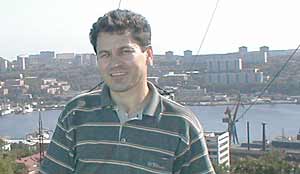
The system built to manage Russia’s nuclear legacy is crumbling, our new report shows
Our op-ed originally appeared in The Moscow Times. For more than three decades, Russia has been burdened with the remains of the Soviet ...
News

Publish date: September 17, 2001
Written by: Jon Gauslaa
News
Pasko-experts:
Last week the Pacific Fleet Court finally managed to interrogate former FSB-investigator Evgeny Izotov, who took part in the search of Pasko’s flat on November 20, 1997. Mr. Izotov was supposed to appear as a witness on September 4, but then he did not show up, which led the Court to issue an order to the police to bring him in.
— These are difficult times
Although the police did not have to use force to carry out its task, it was clear that Izotov did not enjoy the experience. Before the interrogation, Izotov had a short conversation with Aleksandr Tkatchenko of the Russian Pen club. — These are difficult times, when even I, a former FSB-investigator, is brought to Court for questioning like this, Izotov said.
The cross-examination of Mr. Izotov revealed that the search was carried out under dubious and downright illegal circumstances. Izotov admitted that he had allowed several persons who were not members of the search party to enter the flat, which is a clear law violation. Besides, the search took place in the middle of the night, which also violates the law, and the protocol of the search was not set up according to the demands of the Criminal Procedure Code.
Izotov tried to excuse the violations with claiming that the FSB had an urgent need for carrying out the search, but personally he had not paid much attention to what was going on. It was not his case and he had not known what they had been looking for.
— And who gave this order? Perhaps Pushkin, the poet?
— No, it was not Pushkin. It was chief-investigator Egorkin…
— Mr. Izotov’s testimony was important, said defender Ivan Pavlov after the court session. We have previously filed a petition to the Court where we point out that the search was carried out illegally. The protocol of the search does not prove that the material, which the FSB now claims was confiscated at the search, actually was confiscated. It could just as well have been “inserted” to the protocol later. Izotov’s testimony confirms our points and thus, our demand that the protocol must be precluded as evidence was substantiated.
Experts: Less ‘secrets’ than before
Simultaneously as former investigator Izotov was sweating in the witness stand, the experts from the Ministry of Defence who have evaluated whether there are state secrets or not in the materials that allegedly were confiscated at Pasko’s flat, finalised their work, which was presented to the Court on September 14. It turns out that the conclusions in the experts’ 47 page document differs considerably from previous expert conclusions on the same issue. Although the experts still maintain that there are state secrets in the disputed materials, the number of such secrets has been reduced.
— While the previous experts claim that Pasko on ten different occasions has collected or disclosed information pertaining to state secrets, the new experts are of the opinion that three of these ten episodes do not contain state secrets, said Ivan Pavlov.
These episodes are an article Pasko wrote on the decommissioning on nuclear submarines; a report on the economical and social situation in the Vladivostok area; and a film Pasko shot of a train carrying spent nuclear fuel. The latter episode is a key point in the charges and thus, it is an interesting development that the experts no longer consider the film as a secret object.
Experts interrogations to start on September 19
The Court has announced a break until September 19, when it will start its interrogation of the experts. The length of the interrogation will depend on the need for asking the experts questions, but the interrogations may well take several days.
*****
Grigory Pasko was arrested in November 1997 on charges of espionage on behalf of the Japanese TV-station ‘NHK’. He was acquitted of espionage in July 1999, but convicted of abuse of his official authority and freed under a general amnesty. Seeking a full acquittal, Pasko appealed the verdict, but so did the prosecution, insisting he was a spy. The Military Collegium of the Russian Supreme Court cancelled the verdict in November 2000, and sent the case back to Vladivostok for a re-trial. The re-trial started on July 11, 2001.

Our op-ed originally appeared in The Moscow Times. For more than three decades, Russia has been burdened with the remains of the Soviet ...

The United Nation’s COP30 global climate negotiations in Belém, Brazil ended this weekend with a watered-down resolution that failed to halt deforest...

For more than a week now — beginning September 23 — the Zaporizhzhia Nuclear Power Plant (ZNPP) has remained disconnected from Ukraine’s national pow...

Bellona has taken part in preparing the The World Nuclear Industry Status Report 2025 and will participate in the report’s global launch in Rome on September 22nd.